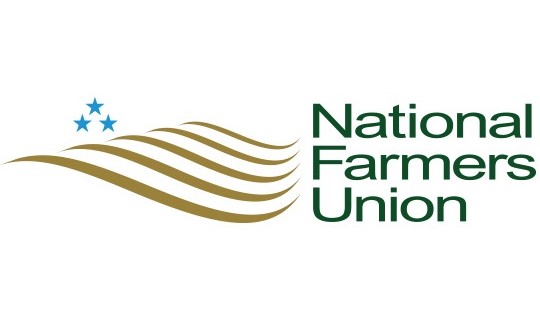
Agricultural News
House Judiciary Committee Addresses Effects of Concentration on US Food Supply
Fri, 21 Jan 2022 09:03:57 CST
 On Wednesday the House Judiciary Committee, Antitrust Subcommittee held a hearing on "Addressing the Effects of Economic Concentration on America's Food Supply."
On Wednesday the House Judiciary Committee, Antitrust Subcommittee held a hearing on "Addressing the Effects of Economic Concentration on America's Food Supply."
In testimony submitted by National Farmers Union, President Rob Larew documented the extreme corporate concentration in America's farm and food system and discussed steps that must be taken to ensure a more resilient food supply for consumers and a competitive marketplace for family farmers and ranchers.
The full testimony is as follows:
Chairman Cicilline, Ranking Member Buck, and members of the committee,
Thank you for holding a hearing on "Addressing the Effects of Economic Concentration on America's Food Supply." This issue is of critical importance to the family farm and ranch members of National Farmers Union (NFU).
NFU is a grassroots organization that advocates on behalf of family farmers, ranchers, and rural communities. Founded in 1902, today NFU represents approximately 200,000 farmers across the country whose operations range in size, type, and production method. NFU's policy book, established annually at our national convention by our members, states that "inadequate market competition is one of the most pressing issues facing producers across the country." The inadequate market competition we face today must be addressed to protect our family farms and all the communities that depend on them for food, fiber, and fuel.
We applaud Chairman Cicilline's leadership and the efforts of this committee, to address pressing competition concerns regarding "Big Tech." Like their counterparts in the technology sector, the largest food and agriculture corporations wield enormous market power. In both cases, a small handful of multinational corporations dominate the entire system. These food and agriculture companies are also essential to our national security, much like technology companies. We are thankful that the chairman and the members of this committee are shining a spotlight on the important issue of economic concentration in the food supply, and we urge you to extend your investigation to legislative action to make our farm and food system fairer and more competitive.
Last year, NFU launched the Fairness for Farmers campaign, a nationwide effort to give voice to the farmers, ranchers, and communities being harmed by economic concentration and to advocate for solutions. The Biden administration has clearly heard the call for greater competition in agriculture and many other sectors of the economy. President Biden's Executive Order on "Promoting Competition in the American Economy" calls upon more than a dozen federal agencies to institute reforms, promulgate rulemakings, and conduct oversight, to address rising corporate consolidation. Many of the directives in the executive order specifically address competition issues in agriculture and rural economies. We appreciate the concerted efforts of the current administration, many members of Congress, and this committee, to address the harmful effects of economic concentration. NFU stands ready to continue working with you to establish and implement needed reforms.
The state of competition in America's farm and food supply chain
A small handful of dominant firms control the market for most farm inputs (such as seed, crop protection, fertilizer, and in equipment manufacturing), processing, food manufacturing, wholesale distribution, food service, and retail grocery. These very large firms in the middle of the supply chain wield immense market power, as oligopolists or oligopsonists (and in some cases as monopolists or monopsonists), compared to farmers and consumers.
The four-firm concentration ratios (CR4), a commonly used metric for illustrating market concentration that specifies the market share for the top four firms in an industry, is high in nearly all sectors that touch the food supply chain. In 2018, the CR4 for companies slaughtering and processing beef, pork, and chicken was 85 percent, 70 percent, and 54 percent respectively. While the magnitude of national-level industry consolidation may be lower for broilers, concentration is often higher in more localized markets. As of 2015, the top four firms for corn and soybean seeds controlled 85 percent and 76 percent of the market, respectively; this compares to 59 percent for corn seed in 1975, and 42 percent for soybean seed in 1988. Four firms account for approximately 84 percent of the global herbicide and pesticide market, and just two companies manufacture about half of the tractors and other essential farm machinery used by farmers. Market share in retail grocery is also heavily consolidated, with the top four retailers controlling approximately 65 percent of sales in 2018.
Concentrated markets increase opportunities for market manipulation and coordinated behavior. There has been a spate of price fixing litigation brought against major livestock industry companies since 2016, with multiple indictments and guilty pleas. Other symptoms of heavily concentrated markets include supply chain disruptions, which have been particularly disruptive during the COVID-19 pandemic, but also had significant impacts prior (e.g., the fire that shuttered the Tyson Foods Holcomb, Kansas, beef processing plant for several months). The pandemic and other disruptions have highlighted how large, seemingly efficient systems of production can falter when there are shocks.
Unchecked consolidation and corporate power have other important, yet less tangible effects on farmers and rural communities. For example, farmers have less choice and autonomy in a consolidated food system, and this may force farmers to make decisions they would otherwise reject. Constrained choices and lack of options also reduce bargaining power, and a more consolidated farm and food system has detrimental effects on communities, including population decline and widening income inequality.
The causes of economic concentration in agriculture and the food supply
The incentives for firms to merge or acquire rivals are strong, since getting bigger can increase bargaining power relative to customers and suppliers. Firms also gain market power through vertical integration, where they control multiple links in the supply chain to their advantage. Consolidation, both horizontally and vertically, can help firms exclude smaller rivals from accessing markets, increase barriers to enter markets and compete, and create the conditions for large rivals to work together to manipulate markets to their shared advantage.
Our nation's laws - both antitrust laws and other pro-competition statutory authorities - and their enforcement, ought to have prevented the extreme economic concentration we see today. The current legal regime has clearly failed. The problems we face can in part be attributed to a shift in thinking regarding the interpretation of our existing antitrust laws, which has led to anemic merger enforcement. As companies have gotten larger and competition has declined, anticompetitive conduct by dominant firms has received insufficient scrutiny. For livestock and poultry farmers, the Packers and Stockyards Act (PSA) has seen significant failures in enforcement and have suffered because of past failures to finalize and implement new rules.
Designing and implementing solutions
Several steps must be taken to ensure a more resilient food supply for consumers and a competitive marketplace for family farmers and ranchers. Across the economy, there must be more scrutiny of buyer power, and regulators must consider the need for robust competition at all links of the supply chain. Throughout the food supply chain, market participants must be provided with reliable information through truthful and accurate labeling. Furthermore, increased investment is needed to support local and regional production, processing, distribution, and retail options, and appropriate workforce training to support these systems. Finally, in the meat and poultry sector, rules must be implemented that reinvigorate the Packers and Stockyards Act (PSA), clearly delineate prohibitions on packers under the PSA, and create needed protections for farmers under contract. The Biden administration's recently unveiled Action Plan for a Fairer, More Competitive, and More Resilient Meat and Poultry Supply Chain includes several of these steps and demonstrates an awareness for the need for further action.
Conclusion
Thank you again for holding this hearing and for the opportunity to submit testimony for the record. We appreciate the committee's attention to this important issue.
WebReadyTM Powered by WireReady® NSI
Top Agricultural News
More Headlines...





